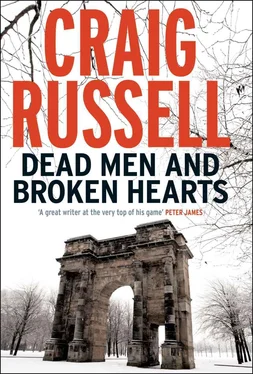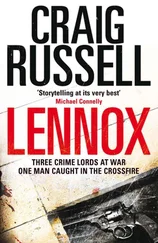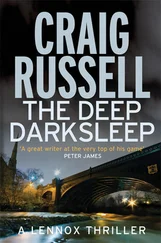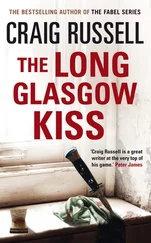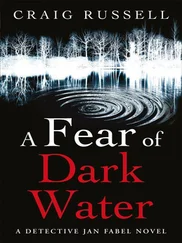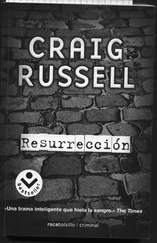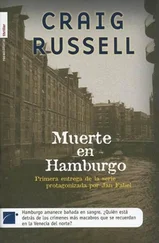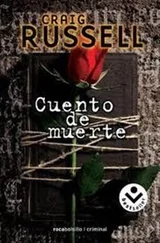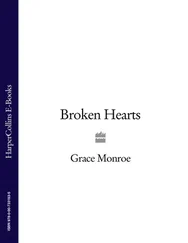Craig Russell - Dead men and broken hearts
Здесь есть возможность читать онлайн «Craig Russell - Dead men and broken hearts» весь текст электронной книги совершенно бесплатно (целиком полную версию без сокращений). В некоторых случаях можно слушать аудио, скачать через торрент в формате fb2 и присутствует краткое содержание. Жанр: Триллер, на английском языке. Описание произведения, (предисловие) а так же отзывы посетителей доступны на портале библиотеки ЛибКат.
- Название:Dead men and broken hearts
- Автор:
- Жанр:
- Год:неизвестен
- ISBN:нет данных
- Рейтинг книги:4 / 5. Голосов: 1
-
Избранное:Добавить в избранное
- Отзывы:
-
Ваша оценка:
- 80
- 1
- 2
- 3
- 4
- 5
Dead men and broken hearts: краткое содержание, описание и аннотация
Предлагаем к чтению аннотацию, описание, краткое содержание или предисловие (зависит от того, что написал сам автор книги «Dead men and broken hearts»). Если вы не нашли необходимую информацию о книге — напишите в комментариях, мы постараемся отыскать её.
Dead men and broken hearts — читать онлайн бесплатно полную книгу (весь текст) целиком
Ниже представлен текст книги, разбитый по страницам. Система сохранения места последней прочитанной страницы, позволяет с удобством читать онлайн бесплатно книгу «Dead men and broken hearts», без необходимости каждый раз заново искать на чём Вы остановились. Поставьте закладку, и сможете в любой момент перейти на страницу, на которой закончили чтение.
Интервал:
Закладка:
It turned out not to be an abandoned croft but a bothy in a full state of repair. Bothies were small buildings maintained to provide shelter for hill walkers and mountaineers.
A notice board by the door instructed me in the etiquette of using the bothy’s facilities. Basically, you were expected to leave the shelter how you found it, and if you took a dump you did it outside away from a watercourse; no trash to be left in the bothy when you left, that kind of thing.
The building itself was a rectangle of two-foot thick stone walls, divided into two rooms, each accessed from a separate door and not connected internally. The first room was the accommodations: a basic box of a room of naked, unplastered stone with a large fireplace and chimney breast in the soot-stained back wall. A robust table of some dense wood that was unidentifiable under several layers of lacquer sat beneath the single, square window. The second room was a storeroom containing a shovel for latrine digging, a box of candles and a couple of brooms. There was even a pile of firewood, which the notice on the wall advised had to be replaced if used.
The bothy was a godsend. I reckoned that at this time of year there wouldn’t be many walkers up in the hills, although I knew it was a fraternity not noted for its common sense when it came to the weather, and the bothy was closer to a settlement, albeit a small one, than most were. If I were stuck, I could camp down here overnight.
I had been wrong about having a view of the village from it, however. A thicket of trees and a swell in the hillside obscured the view, meaning I would have to head back down the trail a little to see it; but that also meant that the bothy could not be easily seen from the village or its approach road.
I left my stuff in the bothy and walked back down the trail to where I could get a good view of the village, using my new binoculars to watch any activity. There was none. The village consisted of a clutch of cottages arranged on either side of the road, two larger houses and an inn. There was the massive shoulder of a mountain behind the village and I could see a second clutch of buildings higher up, about a half-mile from the village on the far side, and I recognized it as a farmhouse and outbuildings. But it was the second house that interested me. It was a grander sort of place and more like something you would see in town. A big, solid villa, with two wings to it and a separate stable block. I guessed that the farm was a tenancy of the big house.
Being on the other side of the village, the big house was too far away for me to keep tabs on from where I was. I needed to get closer.
I went back to the bothy and brewed up some tea with the gas canister stove, not wanting to light a fire and make smoke, despite the fact that the bothy was pretty much hidden from the village. I stretched out Ellis’s map on the table and took the automatic from my backpack, checked the magazine and safety, and tucked it into the waistband of my flannels, obscured from view by the waterproofs, the heavy turtleneck sweater and the anorak. No one would see the gun, all right, but I sure wasn’t going to win any fast-draw contests.
I leaned over the table and examined the map. Ellis’s mark corresponded to my current location. What I was looking for was somewhere in the village, the farm or the large house I had seen.
This was where Ellis had come the night his wife had heard him on the telephone. I knew that for sure. I’d known it ever since I’d examined the mark on the map more closely at the barge’s window. The mark wasn’t a cross after all.
It was a ‘T’. ‘T’ for Tanglewood.
CHAPTER FORTY-FOUR
It was, I reckoned, time for lunch.
I walked down the hillside, and along the valley towards the village. My destination was the inn and I wore my rucksack to convince anyone who cared that I was one of the more hardy, or foolhardy, of Scotland’s wilderness wanderers.
The inn was a long, low jumble of stonework and small, irregular windows. It was one of those places you came across every now and then in Scotland: inns and taverns that had offered rest and nourishment to the weary and hungry traveller continuously since the days of Bonnie Prince Charlie or before.
In fact, the mutton pie they served me with a pint of roomtemperature beer tasted like it had been in the pantry since the last visit of the Young Pretender — probably when, during one of Scotland’s more dignified historical moments, the Prince had stopped by for a snack before slipping into women’s clothing and skipping town.
The welcome I got from the barkeep reminded me that dour is indeed a Scottish word, and I was tempted to ask him if he had a brother in Milngavie, in the newsagent business. Instead I smiled and took the tepid beer over to a table.
The only other customers were a pair of old boys at the bar who watched me expressionlessly but constantly from the moment I came in. They had obviously run out of conversation sometime around the Boer War and the lack of animation in their expressions would have made Archie McClelland look like Danny Kaye. They could have been twins, I thought, their white, wrinkled, leathery faces identical under matching flat caps. They probably weren’t twins, though: this was rural Scotland where everybody unrelated probably was.
I had once visited Fifeshire, because I had had to — which was the only reason anyone ever visited Fifeshire. Everyone in the ancient Pictish kingdom had shared the same dull-coloured hair and had had the kind of big, long face you would usually associate with a favourite for the one-thirty steeplechase at Chepstow. The look here was different but still familial and I reckoned that, as in Fifeshire, the wedding vows in this part of the world probably included the wording ‘do you take this woman as your lawfully-wedded sister?’
I sat at a table in the corner of the taproom near the fireplace and picked at the mutton pie. Even in the hiker get-up, I felt hugely conspicuous. I guessed they didn’t get a lot of outsiders here. As I had walked along the village main street — basically the road through it — I had seen only one vehicle, and that had been an ex-army Land Rover whose mud-splattered flanks told me that the driver was probably a local farmer. I took some solace in the fact that there was probably a direct ratio between the number of policemen in any given area and the overall population, making my chances of running into the bicycle-clipped forces of law and order pretty remote.
I was still pushing the pie around the plate, wondering if fossilisation was a cooking process, when two men came in and sat at the opposite end of the bar from the two old not-twins in caps. From the way the geriatrics shifted their gloomy attention from me to the two new customers, I guessed that the recent arrivals were, like me, strangers.
I checked them over without making it obvious. They were both dressed in ordinary suits beneath raincoats and one of them, the one with the curly dark hair and beard, was built like a house on legs, while the other was lean and more athletic-looking. Despite his less impressive build, it was the thinner of the two that had the look of a hard and dangerous man. When he took off his hat and hung it up on the rack by the door, his blond hair was skull-clingingly oiled and combed back from his brow and the skin on his hard-featured face was pock-marked.
I didn’t recognize either man. But that didn’t mean that they hadn’t been part of the crew who had turned up outside Larry Franks’s place. Despite everything having happened as a blur, the two guys who had left Ellis dying in my office and with whom I’d exchanged pleasantries on the stairs had made a big enough impression on me to remember their faces. These guys definitely weren’t them.
Читать дальшеИнтервал:
Закладка:
Похожие книги на «Dead men and broken hearts»
Представляем Вашему вниманию похожие книги на «Dead men and broken hearts» списком для выбора. Мы отобрали схожую по названию и смыслу литературу в надежде предоставить читателям больше вариантов отыскать новые, интересные, ещё непрочитанные произведения.
Обсуждение, отзывы о книге «Dead men and broken hearts» и просто собственные мнения читателей. Оставьте ваши комментарии, напишите, что Вы думаете о произведении, его смысле или главных героях. Укажите что конкретно понравилось, а что нет, и почему Вы так считаете.
